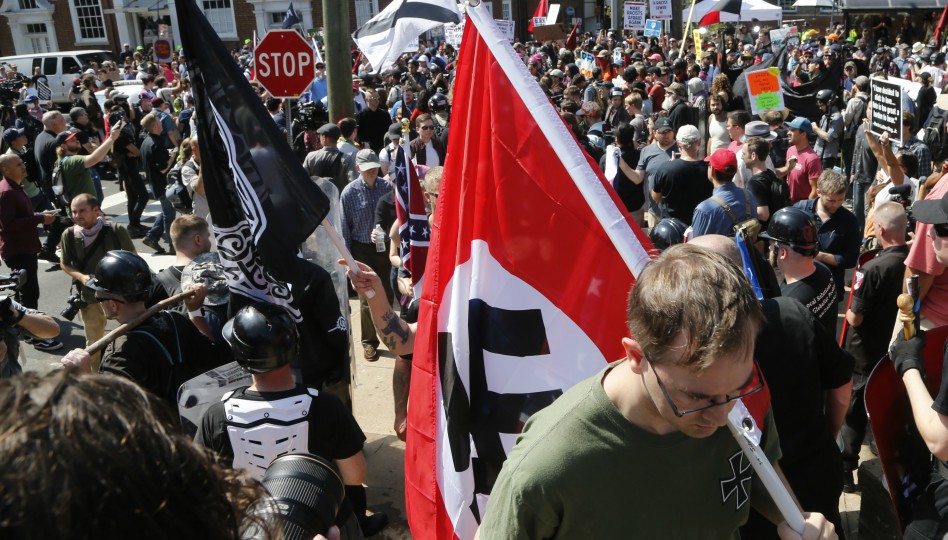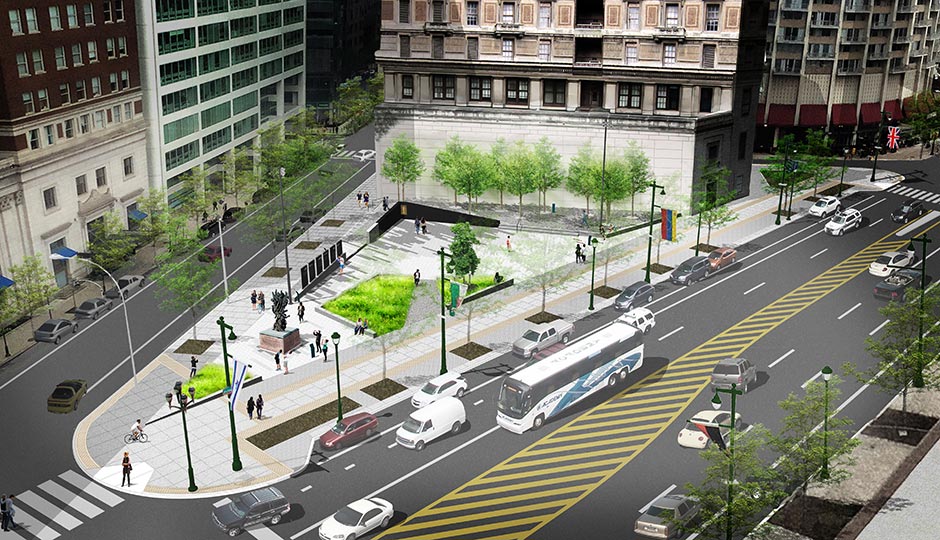OPINION: There’s Only One Solution to the Hate That Fueled Charlottesville

A white supremacist carries a Nazi flag into the entrance to Emancipation Park in Charlottesville, Va. on Saturday, August 12th. (AP Photo/Steve Helber)
In reference to history’s most horrific events, we often utter the words “Never forget.” But perhaps as important is that phrase’s unspoken corollary: Never ignore.
Nestled in the cocoon of democratic America seven decades after the Holocaust, many of us go about our daily lives thinking that Nazi-style hatred and prejudice are largely a thing of the past. If only it were so.
Like many other forms of irrational hatred, anti-Semitism remains in full bloom in 2017. Cable news channels were recently on high alert with wall-to-wall coverage of the goings-on in Charlottesville. While ostensibly protesting the removal of a statue of Robert E. Lee, demonstrators in the Virginia city chanted “the Jews will not replace us” and carried swastikas — crystal-clear confirmation that anti-Jewish bigotry has not been eradicated.
Nor, to be clear, is this hatred confined to the deep South. In August, the New England Holocaust Memorial was vandalized, the second such attack at that memorial over the past few months.
Perhaps even more unnerving, in the weeks after the Charlottesville events, in which one innocent life was taken away, the fighting has continued in Berkeley and other locales, as competing factions — some rooted in hate — have engaged in violence that seems to detract from the fundamental issues at the heart of their protests.
These displays of intolerance and hatred all come on the heels of a winter that saw headstones toppled in Jewish cemeteries in several major cities.
While the news coverage out of Virginia was extremely troubling, more alarming is the prospect of it not being displayed. Remember: These miscreants bared their black hearts only after being roused by Charlottesville’s decision to remove a statue of Robert E. Lee. Had the city not chosen to take the statue down, the venomous hatred would still be festering unseen and in the shadows of our communities.
Removing racial intolerance from society is no small feat, but the means to that end must start with education. By and large, American society embraces the principles of democracy and tolerance. But there can be no substitute for substantive Holocaust education — which informs children and adults of the unthinkable horrors that have emerged from ignorance and bigotry — as part of any quest to rid the country of this malady.
It is somewhat striking that two of the cities that are emblematizing the most recent batch of racial prejudice are Boston and Charlottesville — each of which served as a place of residence to our country’s Founding Fathers, who fought to establish a republic grounded in religious freedom and equality. Both cities are also centers of education and knowledge, and yet both cities have been torn apart by hatred and intolerance. Nor has the crucible of American democracy eluded these anti-Semitic gestures; earlier this year, Philadelphia’s Jewish cemetery was one victim in a spate of cemetery vandalisms seemingly designed to deliver discomfort to American Jewry.
Recognizing the importance education has in the process of eradicating hatred, the Jewish and broader communities of Philadelphia are working to create a new, expanded Holocaust memorial plaza. The outdoor memorial, located on one of the city’s most visible stretches of roadway, remembers the vile crimes committed in the Holocaust and heralds the message of education and democracy as a solution that can help cure hate. The Plaza will center around six pillars that contrast themes of the Holocaust with their humane, democratic counterparts, juxtaposing “The Master Race” and “Totalitarianism,” for example, with “Human Equality” and “American Democracy.” The message is clear: By promoting American democratic values, we can ensure that these tragedies are never again perpetrated against Jews or other minorities.

A rendering of the proposed Holocaust memorial plaza. Courtesy of the Philadelphia Holocaust Remembrance Foundation
Through education, we can hope to eradicate hatred; but our key takeaway from weeks of troubling demonstrations must be that even when the news cameras take leave of places like Charlottesville, this education will still be required. We must also be prepared to speak up when others don’t to confront hatred and ignorance for what it is.
Out of sight, we are often told, is out of mind. But when the matter at hand is venomous hatred and brutality, “out of mind” is the greatest danger of all.
David J. Adelman is chairman of the board of the Philadelphia Holocaust Remembrance Foundation.


